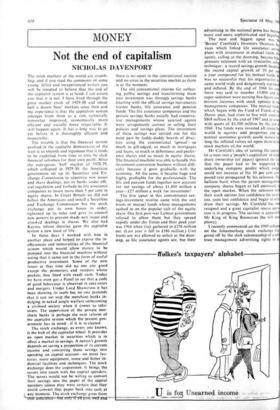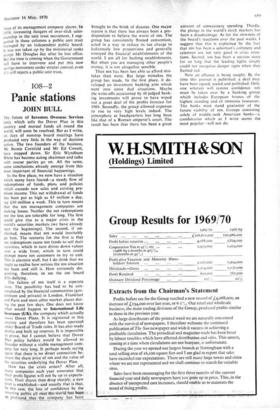MONEY Not the end of capitalism
NICHOLAS DAVENPORT
The stock markets of the world are crumb- ling, and if you read the comments of some young, leftist and inexperienced writers you will be tempted to believe that the end of the capitalist system is at hand. I can assure you that it is not. I have lived through the great market crash of 1929-30 and about half a dozen 'bear' markets since then and my experience is that the capitalism system emerges from them as a rule technically somewhat improved, economically more efficient and socially more respectable. It will happen again. It has a long way to go yet before it is thoroughly efficient and respectable.
The trouble is that the financial system evolved in the capitalist democracies of the west is so smooth and ingenious that it tends to be exploited from time to time by slick financial salesmen for their own profit. After the outrageous 'bull' market of 1928-29, which collapsed in 1929-30, the American government set up its Securities and Ex- change Commission to supervise new issues and share dealings, put its banks under offi- cial regulation and forbade its life assurance companies to invest more than 5 per cent in equity shares. In Great Britain we did not follow the Americans and install a Securities and Exchange Commission but the stock exchange put its own house in order, tightened up its rules and gave its council new powers to prevent shady new issues and crooked dealings in shares. We also had Keynes whose theories gave the capitalist system a new lease of life.
In those days I worked with him in another place and helped to expose the in- efficiencies and immoralities of the financial system which would allow money to be pumped into the financial machine without seeing that it came out in the form of useful productive investment. Some of the new issues at that time did no one any good except the promoters and vendors whose pockets they lined with ready cash. Today we have even got a Panel to see that a code of good behaviour is observed in take-overs and mergers. Under Lord Shawcross it has been showing its teeth but no one pretends that it can yet stop the merchant banks in- dulging in naked jungle warfare unbecoming a civilised society when it comes to take- overs. The supervision of the private mer- chant banks is perhaps the next reform of the capitalist system which the present gov- ernment has in mind—if it is re-elected.
The stock exchange, as every one knows, is the hub of the capitalist wheel. It provides an open market in securities which is in effect a market in savings. A nation's growth depends on saving a proportion of its current income and converting those savings into spending on capital account—on more fac- tories. more equipment, more and better in- dustrial facilities and techniques. The stock exchange does the conversion. It brings the savers into touch with the capital spenders. The savers would not be willing to convert their savings into the paper of the capital spenders unless they were certain that they could convert that paper back into cash at ; any moment. The stock exchange gives them
I'VraralAtirlfter=infratrtritlirrierwetratti
there is no upset in the conventional routine and no crisis in the securities market as there is at the moment.
The old conventional routine for collect- ing public savings and transforming them into investment was through savings banks (starting with the official savings movement), trustee banks, life assurance and pension funds. The life assurance companies and the private savings banks usually had conserva- tive managements whose salaried agents were scrupulously correct in selling their policies and savings plans. The investment of these savings was carried out for the most part by fuddy-duddy boards of direc- tors using the conventional 'spread'—so much in gilt-edged, so much in mortgages and loans, so much in debentures and prefer- ence shares and so much in equity shares. The financial machine was able to handle this investment-conversion business without diffi- culty because it grew gradually with the economy. All the same, it became huge and highly profitable for the professionals. The life and pension funds together now account for net savings of about £1,400 million a year--£27 million a week for investment!
The first upset in this conventional sav- ings-investment routine came with the unit trusts or mutual funds whose managements cashed in on the popular cult of the equity share. Our first post-war Labour government refused to allow them but they spread rapidly under the Tories and their peak year was 1968 when they gathered in £258 million net. (Last year it fell to f186 million.) Unit trusts are not allowed to solicit at the door- step, as life assurance agents are, but their advertising in the national press has becong more and more sophisticated and beguiling
The next and biggest upset was Nil 'Bernie' Cornfeld's Investors Overseas Set vices which linked life assurance saving plans with investment in mutual funds. Hi agents, calling at the doorstep, became hi pressure salesmen with an irresistible sell; technique: a record savings growth based the record capital growth of 10 per a year compound for his mutual funds. was so successful that his organisation be came world-wide and dangerously top-hea and inflated. By the end of 1968 his so force was said to number 13,000 and super-salesmen were earning five-figure co mission incomes with stock options in t management companies. The mutual fun which began with the Fund of Funds of Dover plan, had risen to five with assets $868 million by the end of 1967 and to seve with assets of $1,500 million by the end 1968. The funds were invested all round th world in equities and properties and normal economic growth could sustain f long the inflated values set upon them in ti stock markets of.the world.
Mr Cornfeld's idea of turning the capita ist system into a 'people's capitalism' of wid share ownership (of paper) ignored the fa that the paper had to be supported underlying company profits which simp could not increase at the 10 per cent co pound rate propagated by his salesmen. Th balloon burst when the parent manageme company shares began to fall ominously the open market. When the salesmen wit their stock options lost confidence the save too, soon lost confidence and began to wit draw their savings. Mr Cornfeld has no resigned and a great capitalist rescue oper tion is in progress. The saviour is apparent! Mr King of King Resources (he will n plenty).
I recently commented on the 1969 colla on the Johannesburg stock exchange trig gered off by the slick salesmanship of a un trust management advertising rights to
ffolkes's taxpayers' alphabet
U is fob Unearned income issue of its management company shares. In 1958, foreseeing dangers of over-slick sales- manship in the unit trust movement, I sug- gested in these columns a public unit trust managed by an independent public board. It was not taken up by the ministerial ranks except Mr Douglas Jay after he lost office. But the time is coming when the Government will have to intervene and put this new savings movement under stricter control, even if it still rejects a public unit trust.



































 Previous page
Previous page